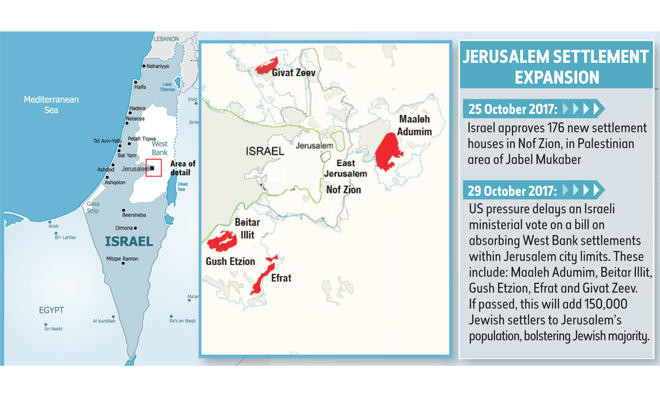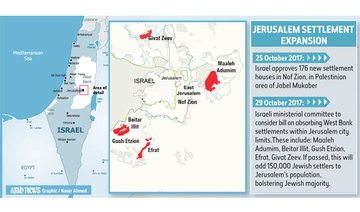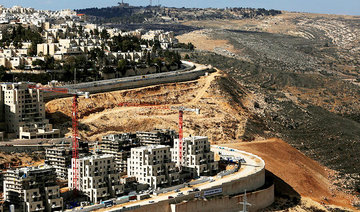JERUSALEM: Under pressure from the US, Israel has delayed a bill that would connect a number of West Bank settlements to Jerusalem, officials said Sunday.
The bill aims to solidify the city’s Jewish majority, but stops short of formal annexation, making the practical implications unclear. The bill says the communities would be considered “daughter municipalities” of Jerusalem.
The Palestinians claim both East Jerusalem and the West Bank, territories captured by Israel in the 1967 war, as part of their future state, a position that has wide international backing. Israel annexed East Jerusalem in a move not recognized internationally.
Israel’s Haaretz newspaper quoted Netanyahu as saying Israel needs to coordinate the bill with the US.
“The Americans turned to us and inquired what the bill was about. As we have been coordinating with them until now, it is worth (to continue) talking and coordinating with them. We are working to promote and develop the settlement enterprise,” it quoted Netanyahu as saying at a government meeting Sunday.
Earlier Sunday, David Bitan, the Likud party’s parliamentary whip and a close Netanyahu ally, told Army Radio the vote was delayed because “there is American pressure claiming this is annexation.”
Peace Now, an Israeli anti-settlement watchdog group, said the bill would amount to “de facto annexation” and be a clear step toward full annexation of the West Bank.
US President Donald Trump’s envoy Jason Greenblatt has been shuttling throughout the region in hopes of restarting peace talks, which last collapsed in 2014.
But in contrast to the Obama administration, Trump has not explicitly endorsed a Palestinian state. He also has shown some tolerance for settlement construction, urging Israel to show restraint but saying a complete halt is unnecessary.
Israel says the fate of the settlements, home to more than 600,000 Israelis, should be decided through peace talks along with other core issues like security.
Also on Sunday, Israeli Defense Minister Avigdor Lieberman he wants to expand the controversial policy of demolishing homes of Palestinians involved in fatal attacks to include perpetrators who seriously wound Israelis.
The minister has instructed the army and Defense Ministry to “examine the possibility to demolish the homes of terrorists who carried out attacks in which Israeli civilians were seriously wounded,” Lieberman said in a statement.
“Destroying the homes of terrorists who carried out murderous attacks is an effective and proven means in the fight against terror and deters those planning attacks,” the statement said.
Israel says the demolition policy, in place since 1967, is a means of deterring future attackers.
Critics of the policy say it is a form of collective punishment, forcing family members to suffer for the acts of relatives, and illegal under international law.
They also question whether the policy acts as a deterrent or if it creates more potential attackers due to the anger it provokes.
Under US pressure, Israel delays move to expand Jerusalem
Under US pressure, Israel delays move to expand Jerusalem

France in communication to maintain Hezbollah-Israel ceasefire, Lebanese statement citing Macron says

CAIRO: French President Emmanuel Macron told his new Lebanese counterpart Joseph Aoun in a phone call that he is in communication to maintain the ceasefire between Hezbollah and Israel, according to a statement by the Lebanese President’s office on X.
Aoun asked Macron to oblige Israel to implement the agreement to preserve stability.
The phone call comes after the Israeli army on Saturday warned residents of dozens of Lebanese villages near the border against returning until further notice, a day after Israel said its forces would remain in south Lebanon beyond a Sunday deadline for their departure under the US-brokered ceasefire that ended last year’s war.
70 freed and ‘deported’ Palestinian prisoners reach Egypt

- According to Israeli list, more than 230 Palestinian prisoners to be released under the deal are serving life sentences
- They will be permanently expelled from the Palestinian territories upon their release
CAIRO: Seventy Palestinian prisoners arrived aboard buses in Egypt Saturday after being released from Israel as part of a Gaza ceasefire deal, state-linked Egyptian media reported.
Al-Qahera News, which is linked to state intelligence, said the prisoners were those “deported” by Israel, adding they would be transferred to Egyptian hospitals for treatment.
According to a list previously made public by Israeli authorities, more than 230 Palestinian prisoners to be released under the deal are serving life sentences for deadly attacks on Israelis, and will be permanently expelled from the Palestinian territories upon their release.
Broadcasted footage on Saturday showed some of the prisoners, wearing grey tracksuits, disembarking from two buses on the Egyptian side of the Rafah border crossing with Gaza.
After transiting in Egypt, the deported prisoners “will choose either Algeria, Turkiye or Tunisia” to reside, Amin Shuman, head of the Palestinian prisoners’ affairs committee, told AFP.
“It’s an indescribable feeling,” one of those released told Al-Qahera News, smiling and waving from the window of the bus.
The prisoners transferred from the Ktziot prison in Israel’s Negev desert into Egypt are part of a group of 200 prisoners released Saturday in exchange for four Israeli hostages freed by Hamas militants in Gaza.
Police kill a man who set himself on fire outside a Tunisian synagogue

- The man advanced toward a law enforcement officer while ablaze, and a second officer opened fire to protect his colleague
- The officer was hospitalized with burns, as was a passerby
TUNIS: A man set himself on fire in front of the Grand Synagogue in the Tunisian capital and was killed by police, the Interior Ministry said. A police officer and a passerby suffered burns.
The man started the fire after sundown Friday, around the time the synagogue holds Sabbath prayers.
The Interior Ministry said in a statement that the man advanced toward a law enforcement officer while ablaze, and a second officer opened fire to protect his colleague. The officer was hospitalized with burns, as was a passerby, the statement said.
The ministry did not release the man’s identity or potential motive for his act, saying only that he had unspecified psychiatric disorders.
Tunisia was historically home to a large Jewish population, now estimated to number about 1,500 people. Jewish sites in Tunisia have been targeted in the past.
A national guardsman killed five people at the 2,600-year-old El-Ghriba synagogue on the island of Djerba after an annual pilgrimage in 2023. Later that year, pro-Palestinian protesters vandalized a historic synagogue and sanctuary in the southern town of El Hamma. And a garden was set ablaze last year outside the synagogue in the coastal city of Sfax.
Tunisia’s recent history was also marked by the self-immolation of a street vendor in 2010 in a protest linked to economic desperation, corruption and repression. Mohamed Bouazizi’s act unleashed mass protests that led to the ouster of Tunisia’s autocratic ruler and uprisings across the region known as the Arab Spring.
‘We cannot forget Sudan’ amid ‘hierarchy of conflicts’: UK FM

- David Lammy: ‘If this was happening on any other continent there would be far more outrage’
- About half of Sudan’s population face acute food insecurity, according to UN
LONDON: The humanitarian catastrophe in Sudan must not be forgotten amid a “hierarchy of conflicts” in the world, the UK’s foreign secretary has warned.
Writing in The Independent, David Lammy called for renewed international attention on the 21-month-long civil war. The humanitarian disaster from the war will be “one of the biggest of our lifetime,” he said.
Since the conflict began in April 2023, almost 4 million people have fled Sudan and fighting has killed more than 15,000, according to conservative estimates.
Lammy visited a refugee camp for displaced Sudanese in neighboring Chad this week. “I bore witness to what will go down in history as one of the biggest humanitarian catastrophes of our lifetimes,” he said.
“The truth no one wants to admit is that if this was happening on any other continent — in Europe, in the Middle East, or in Asia — there would be far more attention from the media — far more outrage. There should be no hierarchy of conflicts, but sadly much of the world acts as if there is one.”
About half of Sudan’s population — more than 24 million people — face acute food insecurity, the latest UN figures show.
The Sudanese Armed Forces and the Rapid Support Forces remain locked in a battle for control of the country and its resources.
Lammy praised the work of the country’s neighbors — including Egypt, Chad and South Sudan — in helping to manage the crisis.
The UN high commissioner for human rights, Volker Turk, warned last week that the war is taking an “even more dangerous turn for civilians.”
On Thursday, the UN Human Rights Office reported that about 120 civilians were killed and more than 150 injured in drone attacks across the city of Omdurman.
Lammy said: “The world cannot continue to shrug its shoulders. There can be no hierarchy of suffering. We cannot forget Sudan.”
The UK has pledged $282 million in aid to almost 800,000 displaced people in Sudan. The funding will supply emergency food assistance and drinking water, among other relief.
Israel blocks Gazans’ return to territory’s north unless civilian woman hostage freed

- ‘Israel will not allow the passage of Gazans to the northern part of the Gaza Strip until the release of civilian Arbel Yehud’
JERUSALEM: Israel said on Saturday it would block the return of displaced Palestinians to their homes in northern Gaza until civilian woman hostage Arbel Yehud is released.
“Israel will not allow the passage of Gazans to the northern part of the Gaza Strip until the release of civilian Arbel Yehud, who was supposed to be released today, is arranged,” Prime Minister Benjamin Netanyahu’s office said.
Israeli military spokesman Rear Admiral Daniel Hagari said, “Hamas did not comply with the agreement on its obligation to return civilian females first.”
Two Hamas sources said that Yehud was “alive and in good health.”
A Hamas source said that she will be “released as part of the third swap set for next Saturday,” February 1.
Earlier on Saturday four Israeli women soldiers held captive in Gaza were released by Hamas and Islamic Jihad.


















